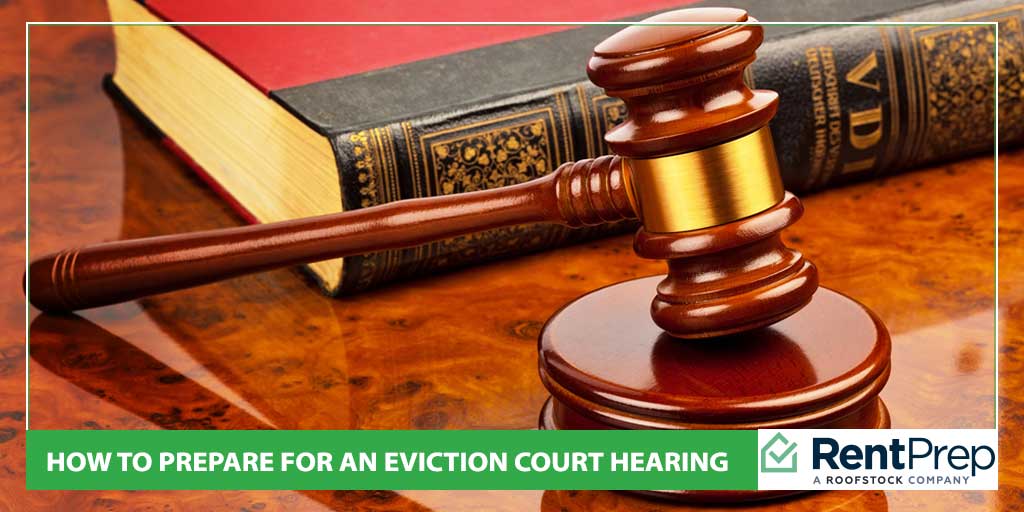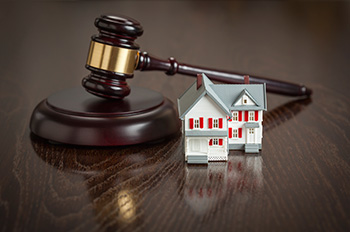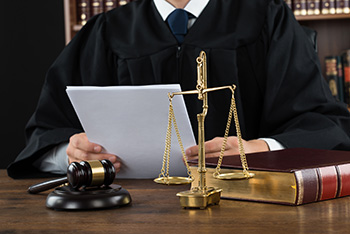
Updated February 2021
At some point in a landlord’s career, it will be time to attend an eviction court hearing. How to prepare for an eviction court hearing is something many landlords are unfamiliar with because they do not think they will ever be in that situation.
However, that’s unlikely to be true.
Whether it’s because the tenant hasn’t paid rent or has violated the lease agreement in some way, there might be a time when the tenant will no longer be allowed to live at the property and the landlord must take action.
A big part of the eviction process is the eviction court hearing, where one or both parties appear in front of a judge or commissioner to present their sides of the story.
Landlords can prepare well in advance for an eviction court hearing. Following certain tips will ensure they are presenting the most accurate version of events and by acting in such a way that they appear credible and knowledgeable in front of the judge.
Do you know what you need to say and do in the courtroom to have a successful eviction hearing? Here’s what you can do.
A Table Of Contents For What Happens In Eviction Court
Knowing what happens in eviction court, what you should prepare in advance, and what is going to happen after the hearing is the first step in broadening your understanding of evictions.
- The Court Eviction Hearing Process
- What Happens At An Eviction Hearing?
- Do You Need Legal Representation For An Eviction Hearing?
- What Happens The Day Of The Court Eviction Hearing?
- If Your Tenant Doesn’t Show Up To The Hearing
- Be Prepared For Best Results
- What Happens After The Eviction Court Date?
- How To Prepare For An Eviction Court Hearing (Checklist)
- Court: More Than Simple Affair
The Court Eviction Hearing Process
 While there are specific variations from state to state, the eviction process follows a fairly specific series of steps that landlords must properly execute in order to remove a tenant from a rental property.
While there are specific variations from state to state, the eviction process follows a fairly specific series of steps that landlords must properly execute in order to remove a tenant from a rental property.
Here is a brief 6-step overview of the eviction procedures:
- The landlord prepares an official notice to the tenant. It could be a “pay rent or quit” notice, a “cure or quit” notice, or simply a “quit” notice, depending on the circumstances.
- The landlord delivers the notice via the acceptable methods of hand delivery at the rental unit or via certified mail, then waits for the tenant to comply or leave the premises.
- If the deadline passes and the tenant does not comply or vacate, the landlord begins an unlawful detainer lawsuit with the local court.
- The court will contact the tenant and the landlord for a hearing date, and both parties attend to present their information.
- The court makes a decision on the eviction and, in most cases, the landlord wins the unlawful retainer lawsuit.
- The case is forwarded on to law enforcement, often the sheriff’s office, to escort the tenant from the property if they still refuse to vacate. Landlords can then change locks and take possession of the rental property.
What Happens At An Eviction Hearing?
To ensure the judge receives every bit of information about the situation, landlords need to gather any documents that will aid the case.
Here are some of the documents landlords may need to bring copies of to turn over to the judge:
- Lease agreement
- Official notices
- Emails, notes, or letters from the tenant
- Notes about phone conversations with the tenant
- Written statements from neighbors, if applicable
- Police reports, if applicable
- Photographs of damage or unsafe conditions, if applicable
- Building inspection reports, if applicable
Having these documents will establish that the series of events as stated by the landlord are what actually occurred. There is no detail that is too small to include, because each piece fits together to present a clear story to the judge.
The key to winning an eviction case is to convince the judge of the landlord’s version of the facts. To do this, the landlord must bring in the evidence to back everything up.
Do You Need Legal Representation For An Eviction Hearing?
Landlords typically do not need to have any type of legal representation for an eviction hearing. You have the right to have a lawyer if you would feel more comfortable, but the cost is usually exorbitant compared to what you can gain from the eviction.
When evicting a tenant, the process you will go through is typically more expedient than your standard civil suit. Eviction cases are handled more frequently and require less overall time investment.
Allegations Of Discriminatory Or Other Illegal Behavior
If you know your eviction tenant intends to accuse you of some type of illegal action, such as discrimination, it may be in your best interests to have a lawyer. It is very possible to show that you did not undertake such actions without a lawyer, but there are still benefits to hiring one.
The primary reason that investing in a lawyer may be a good idea is that suits involving discrimination and other illegal practices can cause you to lose a lot of money if you do not succeed in your case.
At the very least, you should consult a lawyer for legal advice in this situation.
Other Times To Consider A Lawyer
Landlords may want to consider having legal aid in some other situations:
- If this is your first eviction hearing and you are very confused or overwhelmed
- If the tenant has a lawyer and plans to fight the eviction
- If the tenant is filing for bankruptcy
- If there is a housing program or rent control program involved in the eviction terms, as these can be complicated
- If the tenant was formerly employed by you or is otherwise tied to you more than a traditional tenant would be
Each of these cases presents a unique set of challenges. A lawyer can help you navigate these situations more successfully, but you are permitted to handle any of these things on your own if you feel capable doing so.
What Happens The Day Of The Court Eviction Hearing?
Many landlords don’t know what to expect at their first eviction hearing, so it’s important to learn as much as you can about how to dress and act at an eviction hearing.
How To Dress For Eviction Court
When attending a court hearing, it’s a good idea for landlords to wear their best business clothing. That doesn’t mean a full suit and tie for men or a business suit for women, necessarily.
As long as the clothing is clean, simple and pressed, it should be sufficient for court. Landlords should avoid wearing work clothing, jeans, T-shirts, tank tops, miniskirts, and other extreme clothing.
The idea is to make a good impression with the judge and demonstrate that you’re not just a landlord, but also a business owner.
What To Say In Eviction Court
 The judge will set the tone for the hearing and address each party as needed. Landlords will know when it is their turn to speak because the judge will ask questions and follow-up questions.
The judge will set the tone for the hearing and address each party as needed. Landlords will know when it is their turn to speak because the judge will ask questions and follow-up questions.
Landlords should never interrupt the tenant or the judge when they are speaking, but instead should wait their turn. It’s also wise to use concise explanations, descriptions, and statements when speaking.
Landlords can refer to their documents as often as they wish to back up what they are saying. The judge may ask to look at certain documents or may interrupt either the tenant or the landlord during a discussion. This is normal and helps the judge get to the heart of the matter, especially if the landlord and tenant are going off on a tangent that is not related to the case.
Landlords should always speak respectfully to the judge and use honorific titles as appropriate.
How To Act At The Eviction Hearing
No matter how many times a landlord goes to an eviction hearing, there has been a lot of emotion leading up to this point and it’s easy to let emotion take over in the courtroom.
Landlords should always act in a professional and businesslike manner, keeping emotion out of it. Even if the tenant is making a scene and throwing out accusations, it’s best for landlords to remain calm and wait for their turn to speak.
Avoid nervous tics and gestures like tapping, rubbing the face, shifting weight from side to side, licking lips, biting nails, and so forth. No matter the outcome, landlords should remain calm and considerate of the legal process.
After all, you wouldn’t have made it to this point in the eviction procedures if you were not confident and serious about your case. Show that confidence while in the courtroom, and you will be physically showing the court your intentions as well.
If Your Tenant Doesn’t Show Up To The Hearing
It might sound hard to believe, but it is possible that your tenant will be a complete no-show for the eviction hearing!
In situations where the tenant does not appear for the hearing or doesn’t respond to the complaint, the court may allow a default judgment at the landlord’s request.
What Is A Default Judgment?
A default judgment decides the case in favor of the landlord because the tenants didn’t respond to the summons or show up to the court hearing. In cases of no-shows, the court will typically allow this type of judgment.
Landlords who show up with the appropriate documentation after following the proper eviction proceedings will have no issue receiving this type of judgment.
A default judgment typically gives the landlord the right to have law enforcement assist with tenant removal, and it may also allow the landlord to collect back rent, attorney fees, and associated court costs in some cases.
On The Flip Side …
If the tenant moves out before your court hearing, you should still show up to the hearing to finalize the terms of the lawsuit and obtain judgment as the case is already in process. If you don’t show up and the tenants do, you could actually end up owing them money for the associated court costs.
Be Prepared For Best Results
When a landlord has an eviction hearing, the best way to ensure a favorable outcome is to be prepared well in advance so there is no question about what happened and that the judge will have no choice but to believe the landlord’s side of things.
This means that good record-keeping, proper notification, and a professional presence in court will most likely result in a judgment in the landlord’s favor.
What Happens After The Eviction Court Date?
What happens after the eviction hearing is over and the judge has decided how things will be settled? That depends on what the judge says, and there are actually many variable specifics that can come about. Generally, however, the case will fall into one of two categories.
If The Landlord Wins
If you win the eviction case, the judge will issue the terms of how the eviction will final out. The landlord will be granted a writ of possession that shows they may take rightful possession of the property with help from law enforcement.
Additionally, the judge will decide how much back rent, court costs, and other fees will need to be paid. The exact terms will be discussed and explained at the hearing. For example, the judge may award the tenant extra time to back pay their rent.
If The Tenant Wins
When your tenant wins the eviction case, they will likely be permitted to remain at the property. How long they can stay will still depend on the terms of the lease as well as the local landlord tenant law, and you may also be required to pay some fees and expenses to cover the cost of the hearing for the tenant.
How To Prepare For An Eviction Court Hearing (Checklist)
Wrap up your knowing with this final checklist. Work through the checklist in preparation for your next case to ensure you have done everything necessary before you are in front of the judge.
- Sent a formal eviction notice to the tenant regarding the eviction.
- Waited for the formal eviction notice deadline to pass without curing or contact from the tenant.
- Filed for an eviction hearing (unlawful detainer suit) with the local court.
- Prepared the necessary documents to prove your case.
- Practiced what you want to say about the situation and cleared up any potentially confusing details.
- Dressed nicely for the hearing, ready to speak professionally with everyone in the courtroom.
- Adhered to the judge’s decision or challenge it officially through the court system if necessary.
While simple, this basic checklist can give you an idea of where you are in the eviction hearing process and what you need to do next. Don’t let yourself feel overwhelmed by what you are facing; you have the tools to handle this case!
Court: More Than Simple Affair
While there is no good in getting overly worked up about needing to go to an eviction hearing, you do need to take time to properly prepare for it.
Remember to work through each of these steps that are outlined in more detail in the article above:
- Be sure you filed for eviction properly after giving notice to the tenant.
- Keep documentation of every step of the process.
- File for an eviction hearing with the court.
- Prepare for court by choosing the right outfit, planning out what you want to say, and preparing your documentation.
- Stay calm and respect everyone in the courtroom throughout the hearing.
The best way to prepare for eviction is to do everything you can to prevent evictions from happening at all. Using a service like RentPrep to implement more thorough tenant screening processes can help you to find the best tenants and lessen how many evictions you deal with each year! See what RentPrep has to offer today.

